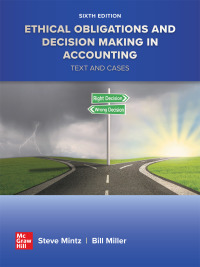Katy Carmichael, CPA, was just promoted to audit manager in the technology sector at a large public
Question:
Katy Carmichael, CPA, was just promoted to audit manager in the technology sector at a large public accounting firm. She started at the firm six years ago and has worked on a number of the same client audits for multiple years. She prefers being placed on same client audits year over year as she believes her knowledge about the client grows each year, resulting in a better audit. Public accounting firms tend to do this as it provides continuity between the firm and the client and often results in a more efficient (less costly) audit as well.
Katy was thrilled to learn that she would be retaining three of her prior audit clients, including what she considers her favorite client (DGS - Drako Gaming Solutions). She has friendships with those in the financial reporting area including the CFO with whom she has makes joint business investments.
The audit planning for DGS’s next audit is about to begin. As is common practice with all audits, each member of the audit engagement team is asked to fill out a questionnaire about any type of relationship (personal, business, or financial) they might have (or any other member of the engagement team might have) with the client company, any of its customers, suppliers, employees, or direct family members of their employees. Katy will soon be meeting with the firm’s compliance partner assigned to the DGS audit to go through the completed questionnaire. In that regard, answer the following questions.
Questions
1. Identify any potential threats to independence that exist based on the facts of the case?
2. Thinking back to the biases discussed in Chapter 2, what biases might the identified threat(s) make Katy more susceptible to and why?
3. Is Katy obligated to discuss her feelings about DGS with the compliance partner when they meet? If so, what should she say? Do you think the compliance partner should remove Katy from the audit? Explain.
4. The SEC seems to be adopting the position that questions about the independence of auditors and the audit engagement can be made based on a materiality criterion. The reason given is that auditors may be able to maintain their objectivity and integrity even when certain relationships exist. In other words, Katy’s relationship with the CFO might be evaluated through the lens of how significant the relationship is with respect to an independent audit. What are the dangers of relying on materiality to judge independence and can reliance on objectivity and integrity be sufficient to make these judgments in Katy’s situation?
Step by Step Answer:

Ethical Obligations And Decision Making In Accounting Text And Cases
ISBN: 9781264135943
6th Edition
Authors: Steven Mintz





